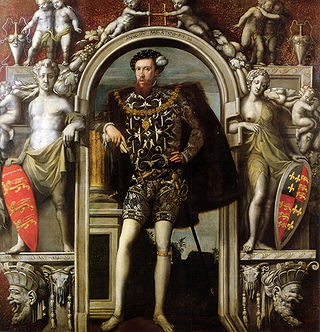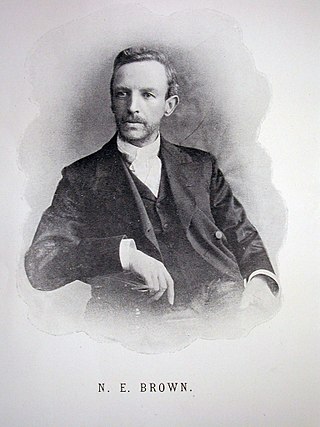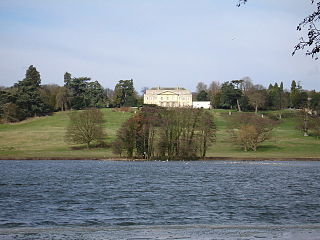Related Research Articles

Surrey is a ceremonial and non-metropolitan county in South East England, to the southwest of Greater London. Surrey has a large rural area, and several significant urban areas which form part of the Greater London Built-up Area. With a population of approximately 1.2 million people, Surrey is the 12th-most populous county in England. The most populated town in Surrey is Woking, followed by Guildford.

Henry Howard, Earl of Surrey, KG, was an English nobleman, politician and poet. He was one of the founders of English Renaissance poetry and was the last known person executed at the instance of King Henry VIII. He was a first cousin of the king's wives Anne Boleyn and Catherine Howard. His name is usually associated in literature with that of the poet Sir Thomas Wyatt. Owing largely to the powerful position of his father, Thomas Howard, 3rd Duke of Norfolk, Surrey took a prominent part in the court life of the time, and served as a soldier both in France and Scotland. He was a man of reckless temper, which involved him in many quarrels, and finally brought upon him the wrath of the ageing Henry VIII. He was arrested, tried for treason and beheaded on Tower Hill.

Lancelot Brown, more commonly known as Capability Brown, was an English gardener and landscape architect, who remains the most famous figure in the history of the English landscape garden style. He is remembered as "the last of the great English 18th-century artists to be accorded his due" and "England's greatest gardener".

Thomas Howard, 2nd Duke of Norfolk, styled Earl of Surrey from 1483 to 1485 and again from 1489 to 1514, was an English nobleman, soldier and statesman who served four monarchs. He was the eldest son of John Howard, 1st Duke of Norfolk, by his first wife, Catharina de Moleyns. The Duke was the grandfather of both Queen Anne Boleyn and Queen Catherine Howard and the great-grandfather of Queen Elizabeth I. In 1513 he led the English to victory over the Scots at the decisive Battle of Flodden, for which he was richly rewarded by King Henry VIII, then away in France.

Thomas Howard, 3rd Duke of Norfolk, was a prominent English politician and nobleman of the Tudor era. He was an uncle of two of the wives of King Henry VIII, Anne Boleyn and Catherine Howard, both of whom were beheaded, and played a major role in the machinations affecting these royal marriages. After falling from favour in 1546, he was stripped of his Dukedom and imprisoned in the Tower of London, avoiding execution when Henry VIII died on 28 January 1547.

The Diggers were a group of religious and political dissidents in England, associated with agrarian socialism. Gerrard Winstanley and William Everard, amongst many others, were known as True Levellers in 1649, in reference to their split from the Levellers, and later became known as Diggers because of their attempts to farm on common land.

Earl of Surrey is a title in the Peerage of England that has been created five times. It was first created for William de Warenne, a close companion of William the Conqueror. It is currently held as a subsidiary title by the Dukes of Norfolk.

Surrey County Cricket Club is a first-class club in county cricket, one of eighteen in the domestic cricket structure of England and Wales. It represents the historic county of Surrey, including areas that now form South London. Teams representing the county are recorded from 1709 onwards; the current club was founded in 1845 and has held first-class status continuously since then. Surrey have played in every top-level domestic cricket competition in England, including every edition of the County Championship.

Clandon Park House is an early 18th-century grade I listed Palladian mansion in West Clandon, near Guildford in Surrey.
The NBC Denis Compton Award was an annual award given to 'The Most Promising Young Player' at each of the 18 first-class counties in England and Wales. The award was made between 1996 and 2011. A player may receive the award more than once.

Nicholas Edward Brown was an English plant taxonomist and authority on succulents. He was also an authority on several families of plants, including Asclepiadaceae, Aizoaceae, Labiatae and Cape plants.
In the 1773 English cricket season, there was a downturn in the fortunes of the Hambledon Club as their Hampshire team lost every match they are known to have played, and some of their defeats were heavy. Their poor results owed much to star bowler Thomas Brett having been injured. Three other county teams were active: Kent, Middlesex and Surrey. Teams called England took part in five matches, all against Hampshire, and won all five.
The list of known High Sheriffs of Surrey extends back to 1066. At various times the High Sheriff of Surrey was also High Sheriff of Sussex.

Gatton Park is a country estate set in parkland landscaped by Capability Brown at Gatton, near Reigate in Surrey, England.

Alistair Duncan Brown, commonly known as Ali Brown, is a former English cricketer who played for Surrey County Cricket Club, before moving to Nottinghamshire for the 2009 season. He was nicknamed "Lordy", in allusion to Ted Dexter because of his aggressively big-hitting, confident batting style. He was a right-hand bat and occasional right-arm off-break bowler, who made 16 One Day International appearances for England between 1996 and 2001, with a best of 118.
Thomas Brown was an English cricketer. Brown was a right-handed batsman who bowled right-arm medium pace. He was born at Bingham, Nottinghamshire.
References
- ↑ "Thomas Brown". ESPN Cricinfo. Retrieved 12 March 2017.